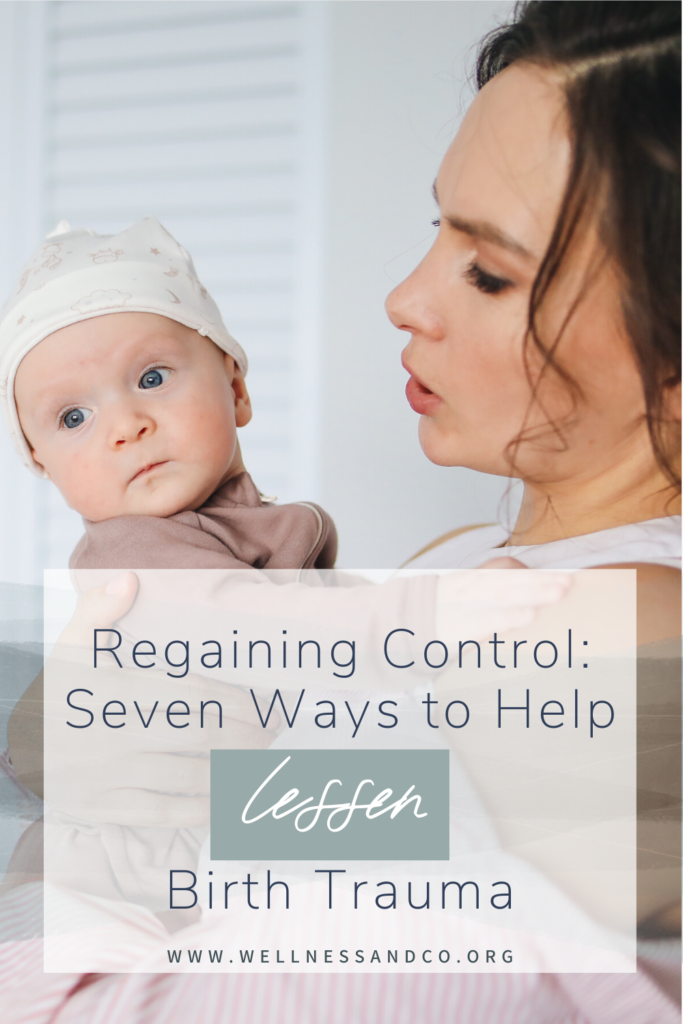Follow
Wellness & Co.
Hi, I'm Dr. K, Wellness & Co. is a growing therapy/coaching practice and educational hub for prospective clients based in Maryland and virtual clients all over the world!
Hi, I'm Dr. K
free guide
e -books
e -course
Regaining Control: 7 Ways to Help Lessen Birth Trauma
September 10, 2024
READING TIME: 5 MINUTES
When I was pregnant with my first child, I had a lot of feelings (as a lot of moms do). I was excited and nervous and a little scared. We read books and researched baby furniture and learned about how to put a carseat in our car. We took a birth class and I took a breastfeeding class. I had two baby showers (actually three, but the last one happened after my preemie daughter was born) and people gave us so many clothes and toys. People made us blankets and quilts and I (at 30 weeks pregnant) painstakingly painted ladybugs all around the wall of the nursery.
I felt so prepared!
I knew all about diapers and swaddling and how babies look when they’re hungry and how to unfold a pack-and-play. (All the necessities lol) But you know what I didn’t do?
I didn’t prepare for the birth part!
All I knew was that the last thing I wanted to do was push a baby out of my body and I thought I might not want drugs but what if I really wanted drugs…?

What I know now is that the birth of your baby is something you should be preparing for.
Now, before you tell me we can’t prepare for it (because I’ve heard that A LOT), hear me out. When I say “prepare” I don’t mean it in the sense that a lot of you are thinking. I know we can’t really know when our baby is going to come or what the potential complications are going to be. I know emergencies happen and there is so much we can’t predict. But I also know there are a lot of things pregnant women can do to help mitigate a potentially traumatic response in childbirth. Here are seven things to consider!
1. Having as much support as possible
Among the research relating to birth trauma (which is really just another way to say PTSD from childbirth), we know that having support lessens the trauma response.
Even if you feel prepared, having a baby for the first time is a brand new experience. New things often feel scary, but new things with support feel less scary. This means:
- making sure your partner knows and is supportive of your wishes during your birth.
- choosing a supportive provider whose philosophy of birth is similar to yours (which can actually be trickier than it sounds…). And finally,
- only allowing supportive people who you are comfortable with to be part of your experience.
My personal rule? The owner of the vagina decides who is in the delivery room! I know your mother-in-law or mother might really really want to witness the birth of your baby…but if having them over for dinner stresses you out, having them there during such a delicate time may just be too much.
2. Managing pain
Pain and the ways in which we experience it ties in hugely to trauma.
There’s a societal misconception that all natural (meaning no drugs) births are not traumatic and all medicated births or c-sections are inherently traumatic. This is not the case! A big factor in trauma centers around your experience of pain. This could mean getting an epidural if you want one or using supportive measures (baths, massage, walking, birth balls) if you don’t.
This could also mean trying supportive measures but deciding on an epidural if the pain starts to become overwhelming for you. Another way to lessen pain for a lot of women is to stay home as long as possible because you are more comfortable (and thus less afraid and experience less pain) in your own space.
Pain and fear are connected heavily to the unknown, which brings me to the next tip….
3. Learning all you can about physiological childbirth and c-sections
As I stated above, so much of our trauma experience is from the unknown and the fears that surround things we don’t know. When a woman goes into labor for the first time, that is a brand new feeling that doesn’t match anything that she’s felt before. For a lot of women, those sensations can be very scary (and it bears repeating – fear makes pain and trauma worse!) If you learn about what normal physiological childbirth looks and feels like by reading positive birth stories and watching videos where birth is portrayed in a normal and not scary way, it can do so much to manage that fear.
In that same vein, if you are preparing for a c-section, learning about that process can do wonders for calming that fear and uncertainty. Even if you are not planning for a c-section, it’s important to have some knowledge of that process in case you need one. The more information you can gather, the less the shock of that experience will be.
4. Maintaining control where you can
I know, I know. A lot of you are saying now that you can’t control everything and you especially can’t control birth. And you’re not wrong! But that’s why I’m saying maintaining control where you can. There are things that are within your control and having that little bit of control is known to mitigate trauma.
Develop a birth plan with a supportive person, ask questions of your medical staff and make sure you are included in the process of your treatment. Most people don’t know this, but you do not have to consent to things you don’t want, you are allowed to ask for second opinions, and you are allowed to ask for time to make a decision alone.
5. Positive affirmations and thoughts
It really is true that our thoughts become our feelings and our feelings become our actions. If you want your birth story to be a positive one, it’s important to start thinking about it in a positive way. I know that so many moms have horror stories they are eager to share (and why wouldn’t they, when 33% of moms consider their birth stories traumatic) but those stories can be scary, and fear leads to more pain….and more trauma.
Surround yourself with positive and helpful information. Stay away from negative people, stay away from tv shows where birth is portrayed in a scary way and try to stay away from all those horror stories.
6. Working on your own past history with regards to trauma
This is where your own therapy before even having a baby can be so transformative in preventing birth trauma. We know that women with a history of abuse, depression, anxiety or trauma have an increased risk of developing PTSD following childbirth. This is especially true for women who have experienced sexual assault.
I’ve worked with several women with birth trauma and most of them have a history of trauma that was triggered during their birth experience. Working with a mental health professional to process through your trauma before having a baby can be vital to not compounding traumatic experiences.
7. Knowing your rights and being prepared to advocate for yourself
Especially for birthing women, it is important to know what you have a right to ask for and expect as a patient.
We’ve already stated that you have a right to consent or not to consent to anything. You also have the right to ask for a second opinion, to leave the hospital at any time, or to ask that things be explained to you in a way that you understand. You have the right to ask questions and to be included in your care.
A lot of trauma comes from women feeling as if their birth was something done to them, not something they actively participated in. It does not have to be this way, mamas. You and your partner can speak up!
I’m here for you,
Erin
Erin Newton has been working with individuals and families for almost nine years now. She specializes in perinatal mental health, birth trauma, and anxiety related issues. She strives to help her clients feel seen, heard, understood and to give them the tools they need to start their own journey of healing.
Leave a Reply Cancel reply
CONTACT
Start Here
BLOG
OUR TEAM
SHOP
ABOUT
©2025 Wellness & Co. | All Rights Reserved | Design by EverMint Design Studio
BACK TO TOP
connect with us on instagram


These are such good tips! Birth trauma is often marked by a surprise change in your birth plan, so preparation is key! I researched c-sections often during the last few weeks of my pregnancy as a “just in case”. Well, after failure to progress in labor and fetal distress, an emergency c-section was the only choice. Luckily, I had done the research and (mostly) knew what to expect.